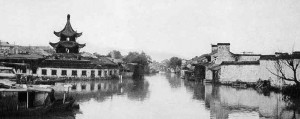The Rhetoric of the Trace: Photography, Place, and History in Republican Nanjing
Catherine Stuer
PhD candidate, University of Chicago
Friday, March 9, 4-6 pm
This paper discusses an expansive photographic project undertaken by Zhu Xie (1907-1968) to record and publish Nanjing’s material remains at a time when the city was redesigned as the modern capital of the new republican state. Conceived as a total representational project of the city’s past, this publication integrates over three hundred photographs taken in situ by the author into a geo-historical study of Nanjing. I unpack how Zhu’s camera links modern metropolitan construction to the destruction of historical traces in a project that is explicitly activist in intent. As professor at the Central University in Nanjing and son of the prominent historian Zhu Xizu (1879-1945), Zhu Xie’s work is situated on the forefront of intellectual and ideological debates of his time. I show how the author actively engages with pre-modern representational genres and projects, while framing his subject at the center of contemporary public and academic discourse. I argue that Zhu Xie deploys these discursive and representational strategies to locate Nanjing’s past traces unapologetically in their fragmented present while rhetorically reconstituting them into an integral vision of Nanjing as temporal and spatial whole. His work thus represents a move against the grain of photographic constructions of the city since the turn of the century, when Nanjing became subject of heightened foreign and factional strategic desires, and ultimately instituted as capital of the modern nation-state. I parse this difference in relation to pre-modern visualizations of the city’s traces, and vis-à-vis contemporary scenic, archaeological, and propagandistic photography of Nanjing.
